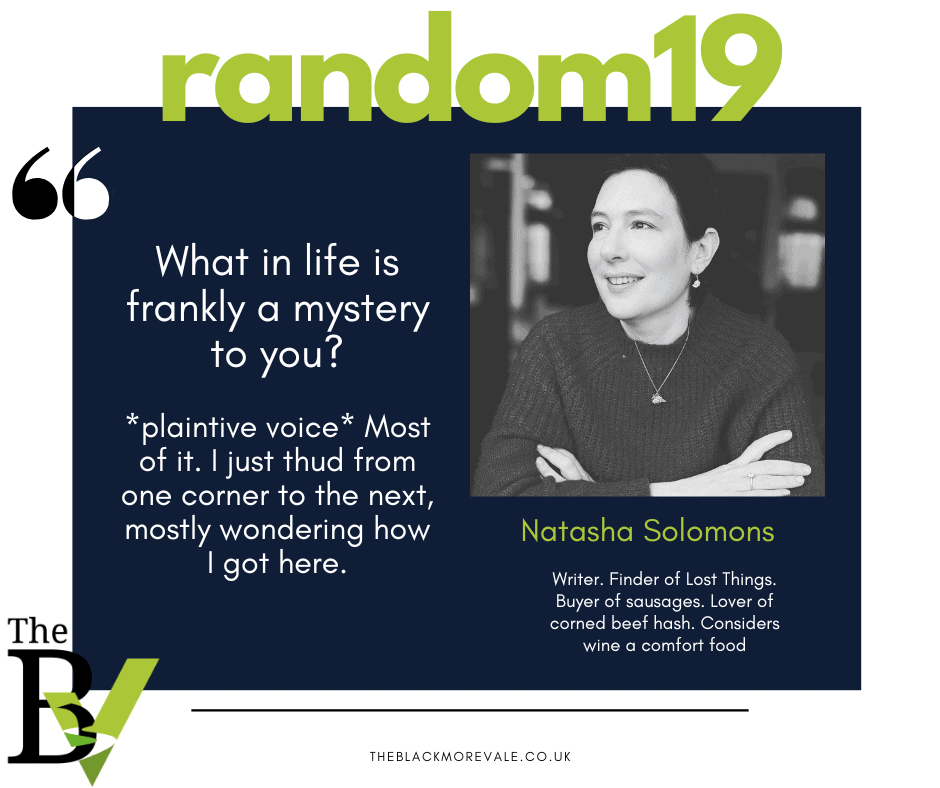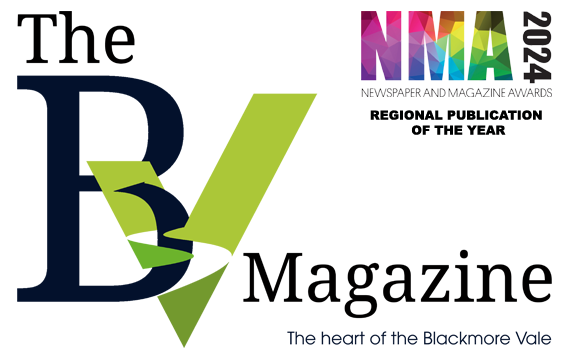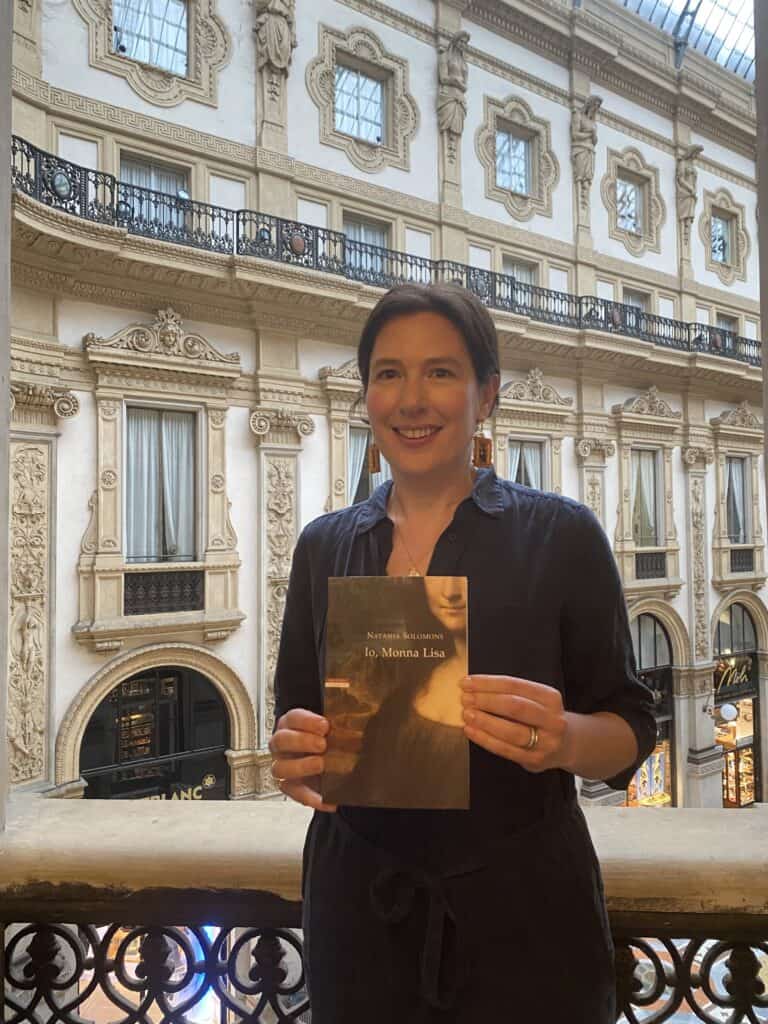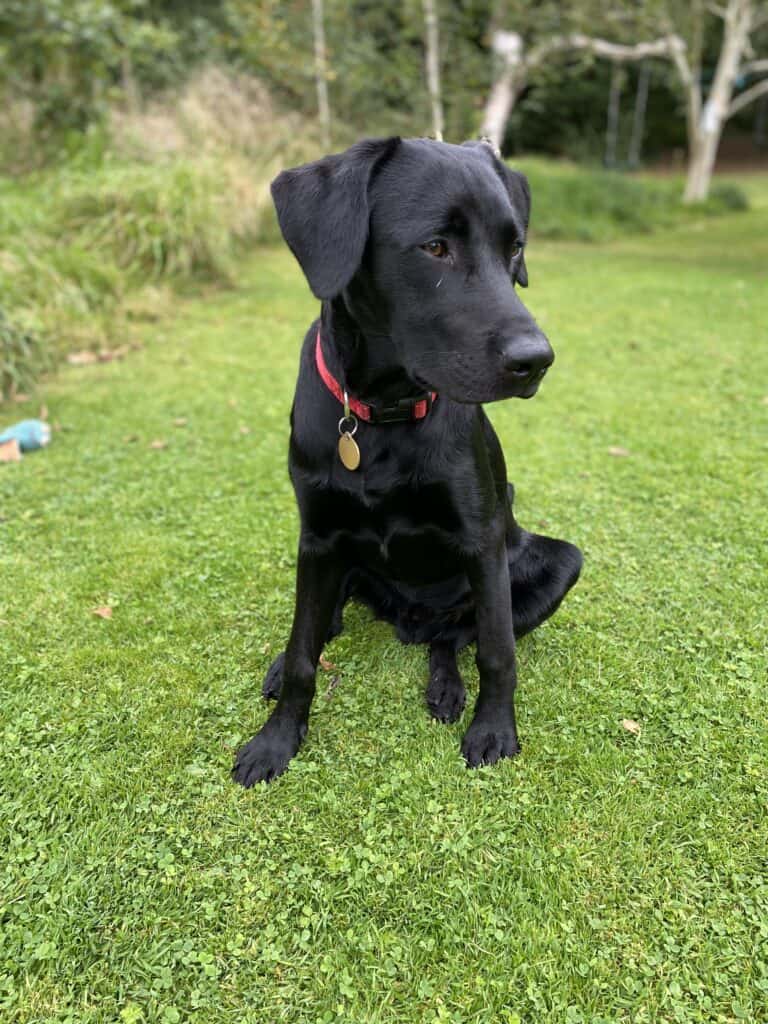Natasha Solomons is the author of five novels, including Mr Rosenblum’s List (set in Dorset) and The Novel in the Viola, which was chosen for the Richard & Judy Book Club. Her latest book, I, Mona Lisa, is just out in paperback

“After university I completed an MPhil in 18th century literature and then began a doctorate researching Women’s Romantic Poetry and the Domestic Muse. Unfortunately, I became un-stuck on a chapter on Verse Letters and so began writing my first novel as a way of avoiding correcting the footnotes. My entire career to date has been an extremely elaborate form of avoiding that tricky chapter …”
1. What’s your relationship with the Blackmore Vale (the loose North Dorset area, not us!)?
My grandparents bought a house here in the 70s with restitution money from Germany. I came here as a child for weekends and holidays, though I went to school in London. I moved here as soon as I could – it was the place in my heart. My first novel was set here and this is the place I feel centred, the place I always come back to. The Blackmore Vale is where I love to come home to.
2. What was the last song you sang out loud in your car?
I’m not allowed to sing out loud in the car. The second I do, my children tell me to stop that awful noise. My daughter complains if I sing she might actually die. Even when I’m alone, their voices are in my head, stopping me.
I used to sing in choirs and probably would have tried singing something like Sumer Is Icumen In to torment them on the 1st May and that would have elicited that response.

3. What was the last movie you watched? Would you recommend it?
After two and a half years of not going to the cinema, the last movie I watched was Sonic the Hedgehog. No. I want those hours of my life back. I ate a lot of pick ‘n’ mix, just for something to do, so that my tongue went blue. No. I wish I had ended my cinema drought with something else.
4. Your favourite quote? Movie, book or inspirational – we won’t judge, but would like to know why.
I don’t have one. It’s not really my thing. I … maybe it’s the Douglas Adams one:
‘I love deadlines. I like the whooshing sound they make as they fly by.’
But … I mean I like it. It’s one I like. But saying it’s my favourite would suggest that I like it more than a line from Jane Austen. I don’t. I like it, it’s funny and true. But how can I like it more than Jane Austen? And how can I like one line from Jane Austen over and above another?
No. I have no favourites. It’s too anxiety-inducing to choose. The pressure’s too much.
5. It’s Friday night – you have the house to yourself, and no work is allowed. What are you going to do?
Run a bath. Read a book. Pour a glass of something to drink in the bath while reading the book. And try really hard not to dip the book in the bath.
6. What is your comfort meal?
Corned beef hash and a big green salad.
And failing that, if I need a lot more comfort, wine.
7. What would you like to tell 15 year old you?
Oh, I need something that 15 year old me will understand, but no one else will …
*Thinks*
“It’ll be okay in the end. And nobody knows anything.”
8. What shop can you never pass by?
The Hambledon Gallery in Blandford. I can NEVER pass it. I love it.
9. What book did you read last year that stayed with you? What made you love it?
Can I cheat and have two? I’ll make it one fiction, one non … Stay with me.
My favourite piece of fiction was by Gabriel Tallent – My Absolute Darling. The subject matter is quite shocking, but that’s not why I loved it. I loved it for its evocation of rural and coastal California. The way he writes about the natural world and the main characters’ relationship with nature, in a place I didn’t know at all, was like nothing else. Lots of people were very uncomfortable with a man writing about a female character, but I find it’s very strange that we’ve got to a place where, as writers, we have to limit our imagination. I found his depiction of a young woman totally convincing.
His descriptions of the storms and the sea, I just loved that part of the book. Parts of it were shocking and disturbing and difficult to read, but I … like books that disturb and challenge me. Some found it too much, but I … didn’t.
My other book is Consent: A Memoir of Stolen Adolescence by Vanessa Springora. She’s an editor in France and she wrote a memoir about her relationship with a famous French writer when she was 14 and he was in his late 40s/early 50s. Essentially he was a serial paedophile. Various women over the years tried to expose this writer for what he was, but the French establishment and police wouldn’t listen – he was so well known he was entirely protected.
Until finally, this very well-known editor in France wrote this book. And now France is beginning to wake up and have its Me Too movement.
But it’s taken 40 years.
It’s remarkable for her strength and courage, but also because it’s an astonishing piece of literature – a sort of anti-Lolita where she writes about his erasure of her self. He not only takes her girlhood and innocence but he steals her voice. He turns her into a character in several of his novels, steals her name, and turns her into ‘his’ character, which is a warped version of herself.
This fictionalised version chases her through her life. She pleads with him and his publishers to remove her from the books, but neither he nor they will. He uses a photograph of her as a child and refuses to stop using it. He doesn’t just take her body, he steals and publishes her voice. And so this unbelievably well-written book is a reckoning, where she says “Here I am” and settles the account. It’s written with such acidity and beauty. Utterly brilliant.
10. Favourite crisps flavour?
*unhesitatingly swift* Salt and vineger. So vinegary they make your cheeks pucker.
11. Cats or dogs?
DOGS. *glances happily at Mr Bingley currently loafing handsomely under the table*
12. What are your top three most-visited, favourite websites (excluding social media and BBC News!)?
How to get your dog to stop barking
The British Library
Authentic Shakespearean insults. I do go there a lot.
Oh and a high runner-up would be an unceasing search for holidays in Italy.
13. What’s the best biscuit for dunking?
I don’t like to dunk biscuits.
Who wants floaters in their tea?
I just don’t like soggy biscuits. Sorry.
Actually, I’m not.
14. What’s your most annoying trait?
Er … I’ve got quite a lot? How do I pick one? I worry about everything. Super anxious. Super self-critical. Nothing’s ever good enough.
I’m also disorganised and forgetful. If left to my own devices, I will forget everything. I’ll casually throw away really important stuff.
We could be here a while … do you need more?
15. Tell us about one of the best evenings you’ve ever had?
Can I cheat with an afternoon instead? We had a really great afternoon in Bath with my children about a month ago to celebrate my most recent book being out. It was so special. We went to an Italian restaurant (obviously – the book’s set in Italy). It was just one of those times. I got tiddly on some prosecco, and we ate so much that my daughter said “she felt like an overstuffed pillowcase”. Then we toddled round Bath, and I signed hundreds of books, and we went to the Baths, and it was just really fun. Low key, just a good day. Being with happy children, having happy times.
Oh, and then in Milan last week, in the Leonardo3 museum, that was really lovely. The photo opposite is of me on the balcony – I was so happy. That was a great evening.
*checks under the table*
Mr Bingley’s is that time he got a sausage for dinner.
16. What was the last gift you gave someone?
Genuinely the most recent? A sausage. For my husband. It was much appreciated.
17. What’s your secret superpower?
I have two. First is the Maternal Object Echo Location Service. It’s a widespread phenomenon, found in most mothers, actually. It’s an ability to find objects that hitherto have been lost, and searched for to no avail for some time up to this point. Socks, toys, pants, shoes, bags … I can find these objects even when I’m not in the room. Even over the phone I have been known to locate them.
My second is every writer’s superpower – an empathic ability to imagine yourself as someone else, in another time, in another situation.
18. What in life is frankly a mystery to you?
*plaintive voice* Most of it. I just thud from one corner to the next, mostly wondering how I got here.
19. You have the power to pass one law tomorrow, uncontested. What would you do?
Stop dunking. Is that too controversial? It’s just too much power. My daughter always wishes for wings. It’s not very practical, but it’s an excellent wish. I think she’d have wings made legal, so I’m going to go with hers.
Natasha wrote a fascinating and very personal essay for the Observer, about her journey to becoming a writer, and what brought her to share the quiet, strong voice of Mona Lisa.
“Listen to my history. My adventures are worth hearing. I have lived many lifetimes and been loved by emperors, kings and thieves. I have survived kidnap and assault. Revolution and two world wars. But this is also a love story. And the story of what we will do for those we love.”
In Leonardo da Vinci’s studio, bursting with genius imagination, towering commissions and needling patrons, as well as discontented muses, friends and rivals, sits the painting of the Mona Lisa. For five hundred tumultuous years, amid a whirlwind of power, money, intrigue, the portrait of Lisa del Gioconda is sought after and stolen. Over the centuries, few could hear her voice, but now she is ready to tell her own story, in her own words – a tale of rivalry, murder and heartbreak. Weaving through the years, she takes us from the dazzling world of Florentine studios to the French courts at Fontainebleau and Versailles, and into the Twentieth Century.
I, Mona Lisa is a deliciously vivid and illuminating story about the lost and forgotten women throughout history.



